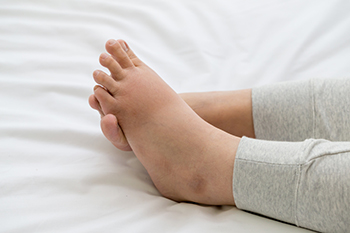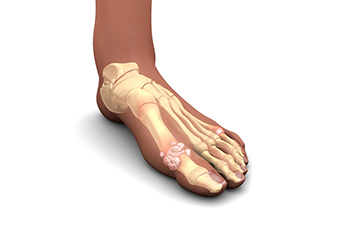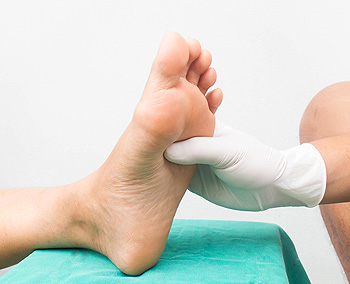

Many women experience discomfort during their pregnancy, and their feet are often affected. Foot pain and swelling often happen in the second or third trimester, making it difficult to complete daily tasks. The noticeable weight gain may cause plantar fasciitis to develop, as a result of the extra weight the heel and arches have to bear. This is a condition that targets the plantar fascia and causes it to become torn or inflamed. Edema is the medical term for swollen feet and is common among pregnant women. It happens from the extra fluids that the body naturally produces to support the growing fetus, and may pool in the feet and ankles. Foot pain may be managed by performing daily stretches which can help to increase blood flow and diminish soreness. Swollen feet may be helped by reducing sodium intake, and drinking plenty of water daily. If your pregnancy causes you to have foot pain or swollen feet, it is suggested that you speak to a podiatrist who can offer you additional relief options.
Pregnant women with swollen feet can be treated with a variety of different methods that are readily available. For more information about other cures for swollen feet during pregnancy, consult with Dr. Stephan J. LaPointe from Georgia Foot & Ankle Specialists . Our doctor will attend to all of your foot and ankle needs.
What Foot Problems Can Arise During Pregnancy?
One problem that can occur is overpronation, which occurs when the arch of the foot flattens and tends to roll inward. This can cause pain and discomfort in your heels while you’re walking or even just standing up, trying to support your baby.
Another problem is edema, or swelling in the extremities. This often affects the feet during pregnancy but tends to occur in the later stages.
How Can I Keep My Feet Healthy During Pregnancy?
If you have any questions please feel free to contact our office located in Rome, GA . We offer the newest diagnostic and treatment technologies for all your foot and ankle needs.

A broken foot is painful. It generally happens suddenly from falling and is considered a common type of injury. Bruising, severe pain, and swelling often accompany a broken foot, and the range of motion can be limited. Walking is difficult, if not impossible, and prompt medical attention is typically sought for relief. Dropping a heavy object on the foot is also a common cause of a broken foot, and the severity of the break may depend on the angle the object was dropped from. People who frequently participate in sporting activities may endure a broken foot, and soccer players may be prone to incurring this type of fracture from kicking the ball. A diagnosis consisting of having an X-ray taken can be performed, followed by beginning the correct treatment. Most people who have broken footwear have a cast or protective boot until it has healed, which can take several weeks. If you have broken your foot, it is suggested that you speak with a podiatrist who can correctly diagnose and treat this condition.
A broken foot requires immediate medical attention and treatment. If you need your feet checked, contact Dr. Stephan J. LaPointe from Georgia Foot & Ankle Specialists . Our doctor can provide the care you need to keep you pain-free and on your feet.
Broken Foot Causes, Symptoms, and Treatment
A broken foot is caused by one of the bones in the foot typically breaking when bended, crushed, or stretched beyond its natural capabilities. Usually the location of the fracture indicates how the break occurred, whether it was through an object, fall, or any other type of injury.
Common Symptoms of Broken Feet:
Those that suspect they have a broken foot shoot seek urgent medical attention where a medical professional could diagnose the severity.
Treatment for broken bones varies depending on the cause, severity and location. Some will require the use of splints, casts or crutches while others could even involve surgery to repair the broken bones. Personal care includes the use of ice and keeping the foot stabilized and elevated.
If you have any questions please feel free to contact our office located in Rome, GA . We offer the newest diagnostic and treatment technologies for all your foot and ankle needs.

Anyone is at risk for getting the foot condition that is known as gout, despite it being more prevalent among men. The chances may increase in women after menopause, and it generally does not happen before then. Existing medical conditions may lead to developing gout, including obesity, alcoholism, and high blood pressure. A genetic history may also contribute to getting gout, in addition to eating foods that have high levels of purines. These types of foods consist of red meat, shellfish, and drinks that are made with large amounts of sugar. The purines convert to uric acid in the blood, and excess uric acid turns to crystals which can lodge in the joints of the big toe. This can cause debilitating pain, and it may be so severe it can be difficult to walk up steps. If you have had one or more bouts of gout, it is strongly suggested that you are under the care of a podiatrist who can effectively treat this condition.
Gout is a foot condition that requires certain treatment and care. If you are seeking treatment, contact Dr. Stephan J. LaPointe from Georgia Foot & Ankle Specialists . Our doctor will treat your foot and ankle needs.
What Is Gout?
Gout is a type of arthritis caused by a buildup of uric acid in the bloodstream. It often develops in the foot, especially the big toe area, although it can manifest in other parts of the body as well. Gout can make walking and standing very painful and is especially common in diabetics and the obese.
People typically get gout because of a poor diet. Genetic predisposition is also a factor. The children of parents who have had gout frequently have a chance of developing it themselves.
Gout can easily be identified by redness and inflammation of the big toe and the surrounding areas of the foot. Other symptoms include extreme fatigue, joint pain, and running high fevers. Sometimes corticosteroid drugs can be prescribed to treat gout, but the best way to combat this disease is to get more exercise and eat a better diet.
If you have any questions please feel free to contact our office located in Rome, GA . We offer the newest diagnostic and treatment technologies for all your foot and ankle needs.

The majority of diabetic patients understand the importance of maintaining good foot care. Neuropathy is a common condition that can develop in people who have diabetes, and it is defined as the inability to feel existing cuts or wounds that have developed on the feet. Having elevated amounts of glucose levels in the blood may lead to poor circulation and nerve damage, possibly causing severe pain and foot ulcers to develop. Proper foot care begins daily with washing and drying the feet, followed by inspecting the soles with a mirror. This is an effective way to notice if any cuts have developed, and a family member or caregiver may help to accomplish this. It is beneficial to have toenails trimmed weekly, which may be helpful in preventing an ingrown toenail from developing. The feet need as much protection as possible, and this can be done by wearing comfortable shoes, in addition to refraining from walking barefoot. If you have diabetes, it is strongly suggested that you are under the care of a podiatrist who can help you to manage this condition and offer additional prevention techniques for maximum foot protection.
Diabetic foot care is important in preventing foot ailments such as ulcers. If you are suffering from diabetes or have any other concerns about your feet, contact Dr. Stephan J. LaPointe from Georgia Foot & Ankle Specialists . Our doctor can provide the care you need to keep you pain-free and on your feet.
Diabetic Foot Care
Diabetes affects millions of people every year. The condition can damage blood vessels in many parts of the body, especially the feet. Because of this, taking care of your feet is essential if you have diabetes, and having a podiatrist help monitor your foot health is highly recommended.
The Importance of Caring for Your Feet
Patients with diabetes should have their doctor monitor their blood levels, as blood sugar levels play such a huge role in diabetic care. Monitoring these levels on a regular basis is highly advised.
It is always best to inform your healthcare professional of any concerns you may have regarding your feet, especially for diabetic patients. Early treatment and routine foot examinations are keys to maintaining proper health, especially because severe complications can arise if proper treatment is not applied.
If you have any questions please feel free to contact our office located in Rome, GA . We offer the newest diagnostic and treatment technologies for all your foot and ankle needs.